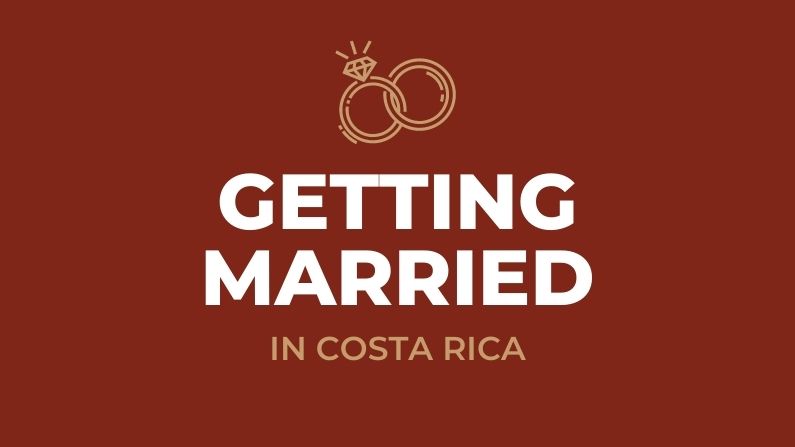When a couple has decided getting married in Costa Rica, many details must be considered to formalize the union, and one of the most important is the celebration of a civil wedding.
In Costa Rica, for a marriage to be legally recognized, it must be celebrated before a Catholic priest, a civil judge, or a notary public, and subsequently registered in the in the Civil Registry.
Getting married in Costa Rica: Marriage Requirements
Regardless of whether the parties are Costa Rican or foreign, they must meet the following requirements:
- Be over eighteen years of age.
- Be in a state of freedom, meaning that none of the contracting parties may be bound by a previous marriage.
- Have voluntary or cognitive capacity at the time of the wedding, meaning that the spouses must be in full use of their mental faculties to expressly consent to their desire to marry.
- Have two witnesses who testify under oath about the freedom of state and legal capacity of the spouses.
The birth and civil status of Costa Ricans will be verified by processing and obtaining birth and civil status certificates issued by the Civil Registry.
In the case of foreigners, they must provide a complete copy of their current passport and issue a notarized affidavit in which they declare, under penalty of perjury, that they are in a state of freedom to contract marriage.
Prohibitions to get married in Costa Rica
It is important to keep in mind that in Costa Rica, marriage is legally impossible in the following cases:
- Between people who are still married, regardless of how long they have been separated.
- Between ancestors and descendants by consanguinity or affinity.
- Between consanguineous siblings.
- Between an adopter and the adopted and their descendants; adoptive sons and daughters of the same person; the adopted and the sons and daughters of the adopter; the adopted and the former spouse of the adopter; and the adopter and the former spouse of the adopted.
- For those who are under 18 years of age.
Is it possible to get married while pregnant?
The answer to whether a pregnant woman can get married is a resounding yes!
Children born within one hundred and eighty (180) days from the celebration of the marriage or the meeting of the legally separated spouses are presumed to be born in wedlock.
However, it’s important to note that if the woman is divorced, children born within three hundred (300) days after the dissolution of the marriage or the separation of the spouses will legally be presumed to be children of the previous marriage.
To avoid any potential inconveniences for all parties involved, if the bride has been divorced less than 300 days ago, she should provide a medical certificate stating that she is not pregnant, which will be included in the marriage certificate.
This small but crucial step will help avoid any presumptions of parenthood that could arise.
Is it possible to get married through a proxy?
Article 30 of the Costa Rican Family Code allows for a marriage to be celebrated through a proxy with an «exceptional power of attorney» granted in a notarized public deed.
The proxy must expressly state the name and general qualities of the person with whom the marriage will be celebrated, and it is a legal requirement that the other party attend the celebration in person.
Warning. However, please note that this type of marriage will no longer be allowed in Costa Rica from the effective date of the Family Procedural Code, which is estimated to be on October 1st, 2024.
From this moment on, the marriage can only take place with the appearance of both parties on the spot.
What is delivered to the spouses after the ceremony is over?
The notary public in charge of celebrating the union will request both parties and the witnesses to sign the notarial protocol.
The contracting parties will receive a testimony signed and sealed by the notary.
However, the marriage will not acquire legal validity until it is registered in the Civil Registry, for which the notary has eight days to present the corresponding testimony and form.
The registration process will take approximately three weeks.
Is it possible to sign a prenuptial agreement before getting married in Costa Rica?
Yes. In Costa Rica, marital capitulations (also known as prenuptial agreements) can be granted before or during the existence of the marriage and can cover present and future assets.
To ensure its validity, the agreement must be recorded in a notarized public deed and registered in the Public Registry under Article 37 of the Costa Rican Family Code.
Even after the marriage has taken place, both spouses can modify the capitulations as needed.
If the couple decides not to sign a prenuptial agreement, each spouse will retain ownership of all assets acquired before getting married and can dispose of them as they wish.
In the event of a dissolution of the marriage, each spouse is entitled to participate in half the net value of the community property established in the other’s assets.
These assets will be chained from the declaration to the results of the respective liquidation. If needed, Family Courts can provide annotation of claims on community property in the Public Registries and inventories deemed pertinent.
Is it possible to register a foreign marriage in Costa Rica?
Yes. If at least one of the spouses is Costa Rican, it’s possible to register a foreign marriage in Costa Rica.
All it takes is a request from at least one of the spouses and the submission of the original certificate issued by the corresponding authority in the country of origin, duly apostilled.
Keep in mind that if the document is not in Spanish, it must be translated by an official translator
Where can a marriage take place in Costa Rica?
A Costa Rican notary public can celebrate a marriage throughout the national territory, without any limitation in this regard.
Accordingly, the ceremony can take place in any office, house, hotel, beach, mountain, or wherever the couple and their loved ones decide.

